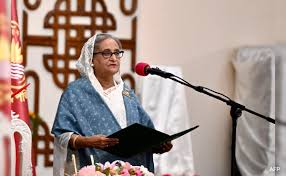Bangladesh’s Prime Minister, Sheikh Hasina, was inaugurated for a fifth term on January 11, securing a substantial win in an election that the opposition boycotted. The Awami League party, led by Ms. Hasina, secured nearly three-quarters of the elected parliamentary seats, with the remaining seats filled by allied parties and supportive independent candidates. The election faced criticism from the United States and the United Nations due to a crackdown late in the preceding year, resulting in the arrest of thousands of opposition party members.
During the oath-taking ceremony at the presidential palace, Ms. Hasina pledged to fulfill the responsibilities of the Prime Minister in accordance with the law. The cabinet reshuffle included the exclusion of about 15 ministers from the previous cabinet, while most senior ministers retained their positions, as indicated by names circulated by the cabinet office.
A.K. Abdul Momen, a career diplomat who served as foreign minister since 2019, was among those dropped from the cabinet. Finance minister A.H.M. Mustafa Kamal, facing health challenges over the past five years, was also reassigned, with another former foreign minister set to take his place.
While Bangladesh, under Ms. Hasina’s leadership, has experienced rapid economic growth, the government has faced allegations of widespread human rights abuses and a severe crackdown on dissent. The January 7 election was boycotted by dozens of opposition parties, denouncing it as a “sham” designed to solidify Hasina’s grip on power. Voter turnout was notably low at 41.8%, just over half of the figure recorded in the previous 2018 election.
Despite the controversy, China and India extended their congratulations to Ms. Hasina, expressing their commitment to ongoing cooperation with the South Asian nation, which is home to 170 million people.



